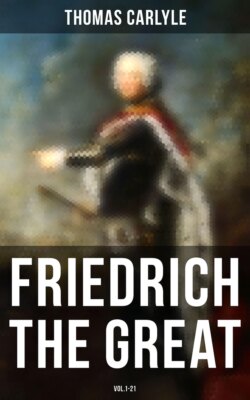Читать книгу Friedrich the Great (Vol.1-21) - Томас Карлейль - Страница 33
На сайте Литреса книга снята с продажи.
OF KAISER HENRY VII. AND THE LUXEMBURG KAISERS.
ОглавлениеTable of Contents
Of the other six Kaisers not Hapsburgers we are bound to mention one, and dwell a little on his fortunes and those of the family he founded; both Brandenburg and our Hohenzollerns coming to be much connected therewith, as time went on. This is Albert's next successor, Henry Count of Luxemburg; called among Kaisers Henry VII. He is founder, he alone among these Non-Hapsburgers, of a small intercalary LINE of Kaisers, "the Luxemburg Line;" who amount indeed only to Four, himself included; and are not otherwise of much memorability, if we except himself; though straggling about like well-rooted briers, in that favorable ground, they have accidentally hooked themselves upon World-History in one or two points. By accident a somewhat noteworthy line, those Luxemburg Kaisers:—a celebrated place, too, or name of a place, that "LUXEMBOURG" of theirs, with its French Marshals, grand Parisian Edifices, lending it new lustre: what, thinks the reader, is the meaning of Luzzenburg, Luxemburg, Luxembourg? Merely LUTZELburg, wrong pronounced; and that again is nothing but LITTLEborough: such is the luck of names!—
Heinrich Graf von Luxemburg was, after some pause on the parricide of Albert, chosen Kaiser, "on account of his renowned valor," say the old Books—and also, add the shrewder of them, because his Brother, Archbishop of Trier, was one of the Electors, and the Pope did not like either the Austrian or the French candidate then in the field. Chosen, at all events, he was, 27th November, 1308; [Kohler, p. 274.] clearly, and by much, the best Kaiser that could be had. A puissant soul, who might have done great things, had he lived. He settled feuds; cut off oppressions from the REICHSTADTE (Free Towns); had a will of just sort, and found or made a way for it. Bohemia lapsed to him, the old race of Kings having perished out—the last of them far too suddenly "at Olmutz," as we saw lately! Some opposition there was, but much more favor especially by the Bohemian People; and the point, after some small "Siege of Prag" and the like, was definitely carried by the Kaiser. The now Burggraf of Nurnberg, Friedrich IV., son of Rudolf's friend, was present at this Siege of Prag; [1310 (Rentsch, p. 311).] a Burggraf much attached to Kaiser Henry, as all good Germans were. But the Kaiser did not live.
He went to Italy, our Burggraf of Nurnberg and many more along with him, to pull the crooked Guelf-Ghibelline Facts and Avignon Pope a little straight, if possible; and was vigorously doing it, when he died on a sudden; "poisoned in sacramental wine," say the Germans! One of the crowning summits of human scoundrelism, which painfully stick in the mind. It is certain he arrived well at Buonconvento near Sienna, on the 24th September, 1313, in full march towards the rebellious King of Naples, whom the Pope much countenanced. At Buonconvento, Kaiser Henry wished to enjoy the communion; and a Dominican monk, whose dark rat-eyed look men afterwards bethought them of, administered it to him in both species (Council of Trent not yet quite prohibiting the liquid species, least of all to Kaisers, who are by theory a kind of "Deacons to the Pope," or something else [Voltaire, Essai sur les Moeurs, c. 67,?? Henri VII. OEuvres, xxi. 184).]);—administered it in both species: that is certain, and also that on the morrow Henry was dead. The Dominicans endeavored afterwards to deny; which, for the credit of human nature, one wishes they had done with effect. [Kohler, p. 281 (Ptolemy of Lucca,) himself a Dominican, is one of the ACCUSING spirits: Muratori, l. xi.?? Ptolomaeus Lucensis, A.D. 1313).] But there was never any trial had; the denial was considered lame; and German History continues to shudder, in that passage, and assert. Poisoned in the wine of his sacrament: the Florentines, it is said, were at the bottom of it, and had hired the rat-eyed Dominican;—"O Italia, O Firenze!" That is not the way to achieve Italian Liberty, or Obedience to God; that is the way to confirm, as by frightful stygian oath, Italian Slavery, or continual Obedience, under varying forms, to the Other Party! The voice of Dante, then alive among men, proclaims, sad and loving as a mother's voice, and implacable as a voice of Doom, that you are wandering, and have wandered, in a terrible manner!—
Peter, the then Archbishop of Mainz, says there had not for hundreds of years such a death befallen the German Empire; to which Kohler, one of the wisest moderns, gives his assent: "It could not enough be lamented," says he, "that so vigilant a Kaiser, in the flower of his years, should have been torn from the world in so devilish a manner: who, if he had lived longer, might have done Teutschland unspeakable benefit." [Kohler, pp. 282–285.]
